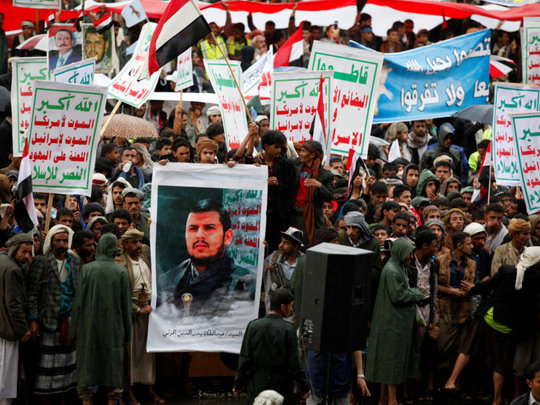
Despite the stubbornness of Al Houthi rebels, a peaceful solution remains a possibility if both Yemeni parties are determined to reach it, said the UAE’s Al Bayan. “The Yemeni government’s resolve was clear as it accepted the United Nation’s peace proposal. This serves as evidence that the legitimate Yemeni government and Arab coalition, spearheaded by Saudi Arabia and the UAE, are keen on peace in order to rescue Yemen from the murky waters it has fallen into because of the rebels and those backing them in Iran. In the peace negotiations in Kuwait, the world can attest that the Arab coalition provided all forms of support for the UN’s efforts to end the suffering of the Yemeni people. The coalition also endured the rebels’ flagrant ceasefire violations, all for the sake of peace. The international community must actively pressure the rebels to accept international resolutions and peace.”
Al Houthi rebels rejection of the UN proposed peace plan reaffirms their deliberate intent to hamper the current negotiations, said Qatar’s Al Raya. “The legitimate government approved the peace plan because it is keen on abiding by international resolutions and also as a way to confirm that the plan is a serious step towards a peaceful solution. Al Houthis, however, are intentionally trying to thwart solutions to the crisis. This was reflected in their decision to form a political council and their rejection of the UN envoy’s proposals. The move to set up this council is a dangerous precedent, and one that should be condemned on the Yemeni, Gulf, Arab and global level. Al Houthis have to realise that the legitimate government has alternatives, and that just because the government is still holding on to the possibility of a peaceful solution does not mean that it is unable to carry out a military solution.”
After the announcement of Hillary Clinton as the Democratic nominee for the US presidency, the UAE’s Al Khaleej talked of her absolute commitment to the security of Israel, without pointing out the country’s policies that oppose peace and reject solutions that provide the minimum rights of Palestinians. “We are standing before a nominee who might be sworn in as the US President in November, and who is fully supportive of the Zionist entity. In her speech before the American Israel Public Affairs Committee (AIPAC) in May, Clinton also reaffirmed her commitment to the security of Israel and condemned ‘Palestinian practices’! This means that there is no hope for a change in the US’ stand towards Israel, and therefore, no hope for a political solution or the establishment of a Palestinian state. This is, however, pretty much the state of every US president, who desperately tries to show their obedience to the Zionist entity.”
Jordan’s unwavering show of support for the Palestinian people comes at a time when Israel is working on expanding its illegal colonies, in actions that threaten the status quo and chances for peace, said the Jordan Times. “The international community cannot stand by and abandon the Palestinians. Jordan will no doubt continue to bring the Palestinian issue to the attention of world powers to ensure that serious work is done to revive the peace process. Jordan has also always called for addressing the root causes of conflict in the region. There can be no long-lasting stability in the Middle East if the Palestinian-Israeli conflict is not resolved.”





_resources1_16a31069e4e_small.jpg)






